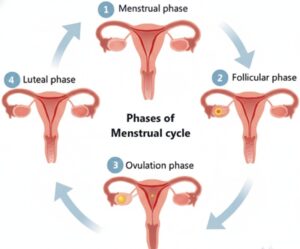How do you know you are pregnant? Early signs, testing time & accuracy explained

Wondering how to know if you are pregnant can be both exciting and nerve-wracking.
Maybe you’ve noticed changes in your body, maybe your period is late, or maybe you just have a feeling something is different. Understanding the signs, knowing the right time to test, and learning how accurate those tests are can help you find answers sooner.
In this blog, we’ll explore the early signs of pregnancy, when and how to test, and what your body might be telling you even before your missed period.
Very early signs of pregnancy before missed period: Listening to your body
Before you even take a pregnancy test, your body might be sending subtle signals.
Very early signs of pregnancy can appear as soon as the first week after conception — though every woman’s experience is unique. Some notice changes almost immediately, while others may not feel anything for weeks.
These are some of the most common first signs of pregnancy:
- Tender or swollen breasts
- Mood swings
- Increased urination
- Fatigue that feels unusual for you
- Mild cramping similar to period cramps, but often lighter
- Nausea or morning sickness (can occur any time of day)
- Sudden dislikes or urges for certain foods
- White, milky, odourless vaginal discharge
How to know if you are pregnant: Taking a pregnancy test
Pregnancy tests detect human chorionic gonadotropin (hCG), a hormone your body starts producing after a fertilised egg implants into your uterus, usually 6–10 days after ovulation.
Best pregnancy test timing:
- For the most accurate result: Wait until the first day of your missed period. By this time, hCG levels in pregnancy tests are usually high enough to be detected, improving pregnancy test accuracy.
- If you want to test early: Some sensitive tests can detect hCG as early as 6 days before your missed period, but early testing increases the chance of a false negative.
- For those with irregular cycles: Count at least 21 days after unprotected sex before testing to reduce the risk of inaccurate results.
If you test too early and get a negative result but still suspect pregnancy, repeat the test after a few days or consult your doctor for a blood test for more accurate results.
Pregnancy test accuracy: What affects your test results
When thinking about how do you know you are pregnant, remember that even the most reliable tests can be influenced by timing, technique, and quality.
Factors that can affect accuracy
- Testing too early – If you test before hCG levels are high enough, you may get a false negative pregnancy result even if you’re pregnant.
- Diluted urine – Drinking large amounts of fluid before testing can lower hCG concentration, making detection harder.
- Expired or faulty tests – Always check the expiry date and follow instructions carefully to avoid unreliable results.
Urine vs blood pregnancy test
Test type | Earliest detection | Pros | Cons |
Urine test | From the 1st day of missed period (some detect earlier) | Affordable, private, and done at home | Less sensitive very early, possible false negatives if too soon |
Blood test | 7-12 days after ovulation | Detects earlier, measures exact hCG levels | Clinic visit required, more costly, longer wait for results |
hCG levels in pregnancy tests
hCG levels in pregnancy tests rise rapidly in early pregnancy:
- 3 weeks: 5–50 mIU/mL
- 4 weeks: 5–426 mIU/mL
- 5 weeks: 18–7,340 mIU/mL
This explains why a pregnancy test 6 days before the missed period may still be negative — your hormone levels may not be high enough yet.
False positive and false negative pregnancy test results
- False negatives – Often caused by testing too soon, using diluted urine, or not following instructions.
- False positives – Less common, but may occur due to early miscarriage, certain fertility medications, or rare medical conditions.
What to do if your pregnancy test result is unclear
If your result is faint, contradictory, or unexpected:
- Repeat the test after 2–3 days to allow hCG levels to rise.
- Consult your doctor for a clinical blood test for greater pregnancy test accuracy.
- An ultrasound provides the most definitive way to confirm pregnancy and assess early development.
What to do after getting a positive pregnancy test
Getting a positive result on your home pregnancy test can be exciting, overwhelming, or both. Here are the key steps to take next:
- Start (or continue) prenatal vitamins that support healthy fetal development.
- Book an appointment with an ob-gyn to get timely pregnancy care.
- Avoid alcohol, smoking, and recreational drugs during your pregnancy.
- Limit caffeine intake, and focus on a balanced, nutrient-rich diet to support you and your baby.
- Prioritise rest, manage stress, and maintain safe levels of physical activity.
Emotional health & support in early pregnancy
Emotional ups and downs are normal in early pregnancy, influenced by hormonal changes and the excitement or anxiety of this life transition. It’s important to acknowledge these feelings as a normal part of the journey.
Surround yourself with supportive people, talk openly about your needs, and don’t hesitate to seek professional help if you feel persistently anxious, low, or overwhelmed.
Remember, pregnancy is not just a physical experience; it’s also an emotional and mental journey that deserves care and attention.
When to see a doctor immediately
Seek medical attention right away if you experience:
- Positive pregnancy test with severe abdominal pain or heavy bleeding – could indicate complications such as ectopic pregnancy or miscarriage.
- Unclear or conflicting test results – especially after repeated home or clinical tests.
- Pregnancy symptoms without a positive test – such as missed periods, nausea, breast tenderness, or fatigue.
- Sudden dizziness, fainting, or extreme weakness – may indicate urgent health concerns.
Signs of infection – including high fever, severe pelvic pain, or unusual vaginal discharge.
Trust Dr Aparna Gumma for expert pregnancy care
With over 28 years of experience in Obstetrics and Gynaecology, Dr Aparna Gumma is one of the most respected and sought-after female gynaecologists in Dubai.
Known for her warm, compassionate care, she has helped countless women — including celebrities like Annabelle, Dubai Bling stars Kris & Brianna Fade, and many VVIP patients — through the earliest stages of pregnancy with confidence and comfort.
Your pregnancy journey deserves the best care.
Book your appointment today and step into motherhood with assurance and support.
About Dr Aparna
Dr Aparna Devi Gumma, female gynaecologist in Dubai, is one of the most trusted partners in women’s health with over 28 years of expertise as an Ob-Gyn and Advanced Gynecologic Laparoscopic Surgeon.
Related Blogs

4 Phases of the Menstrual Cycle and How They Affect Your Moods
4 Phases of the Menstrual Cycle and How They Affect Your Moods The menstrual cycle affects far more than reproduction, yet it’s often dismissed as “just a period.” Many women learn it happens once a month and may be uncomfortable, without understanding how deeply it influences energy, focus, mood, motivation,

Healthy pregnancy meal plan: Essential nutrition guide
Healthy pregnancy meal plan: Essential nutrition guide Nutrition plays a vital role in a safe and healthy pregnancy. A well-structured, healthy pregnancy meal plan helps ensure your baby’s development while keeping you energised throughout your pregnancy. Knowing which foods to eat during pregnancy supports better pregnancy outcomes and overall well-being.

Types of vaginal discharge: What do they mean?
Types of vaginal discharge: What do they mean? Vaginal discharge is a normal, healthy, and essential part of the female reproductive system. It’s the body’s natural way of cleaning and lubricating the vagina, protecting against infection. However, changes in its colour, consistency, or smell can often be the first sign

The Menopause Diet: 5-Day Plan to Lose Weight
The Menopause Diet: 5-Day Plan to Lose Weight For many women, the midlife years bring a frustrating mix of hot flashes, mood swings, and gradual weight gain around the middle. The 5 day menopause meal plan to lose weight is not a “quick fix” diet, but a structured way to
